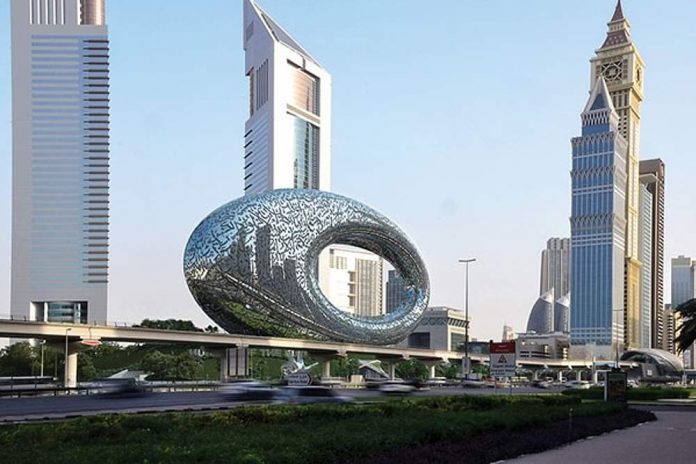The Dubai Council for the Future of Humanitarian Work held its first meeting to explore adopting the latest technologies in the humanitarian field and examine the current trends and challenges facing the sector globally.
Chaired by Saeed Al Eter, Assistant Secretary General of Mohammed bin Rashid Al Maktoum Global Initiatives,MBRGI, and Director General of the Executive Office in Dubai, Chairman of the Council,
the meeting addressed Dubai’s vision to become one of the largest humanitarian hubs in the world, investing its unique infrastructure and information platform to foresee the future of philanthropy.
Al Eter said the Dubai Council for the Future of Humanitarian Work will adopt pioneering initiatives to contribute to developing the humanitarian sector locally and internationally, in collaboration with
all parties involved to face current challenges in the field.
The council will also launch indicators to measure performance and efficiency of philanthropic services, and provide necessary support to encourage studies and reports to examine the future of humanitarian work.
Al Eter referred to the low global expenditure on research, development and innovation in the humanitarian field, compared to other sectors, as the main challenge lying ahead.
“Figures show the missed opportunities of implementing modern technology and innovative solutions in the humanitarian field. Dubai is ranked as a leading city in future fields like innovation and Artificial Intelligence that we aim to apply in the humanitarian sector.”
He emphasised on collaborating with partners to enrich the humanitarian sector with new ideas and sustainable developmental initiatives. The Dubai Council for the Future of Humanitarian Work
aims to draw the future roadmap to position Dubai as one of the world’s leading cities in humanitarian sector through implementing new AI technologies and innovation.
Among the meeting’s key discussion points was reevaluating the mechanism of humanitarian services and finding solutions to build adaptable societies to the modern rapid changes, in the line with objectives of Dubai Future Councils to share knowledge and expertise to find innovative solutions to challenges, launch initiatives and national strategies to face current challenges in key sectors.
Attending the meeting were Dr. Hamad Al Shaibani, Director General of the Islamic Affairs and Charitable Activities Department in Dubai; Tariq Al Gurg, Chief Executive Officer at Dubai Cares;
Dr. Manal Taryam, Executive Director of Primary Health Care; Mousa Khoury, Head of Shari’a Management at Dubai Islamic Bank; Muna Al Kendi, Director of Strategic Communication Center at the Executive Office; Khalifa Al Shaer, Director of Tolerance Department at the International Institute for Tolerance; Dr. AbdulSalam Al Madani, Chairman of INDEX Holding; Dr Waleed Al Ali, advisor at Mohammed bin Rashid Al Maktoum Global Initiatives; Maysa Jalbout, CEO of Al Ghurair Foundation for Education; Gerhard Putman-Cramer, diplomat and Permanent Observer of the Mediterranean to the United Nations.
Al Eter pointed to MBRGI’s 33 entities that support over 130 million people across 116 countries, adding that the Foundation was established to mobilize resources and integrate all humanitarian, developmental and social initiatives under one umbrella and one goal of building a better future for humanity.
He said MBRGI, launched with AED1 billion worth of investments, works to implement innovative solutions in humanitarian services to meet challenges and needs dictated by the rapidly changing modern age.
Highlighting the current challenges facing the humanitarian sector, Al Shaibani said, “The legal aspect is among the main challenges facing the humanitarian field. We need constant law and legislative amendments.”
He also pointed to the need to develop a cadre of trained journalists to cover humanitarian work and highlight the role of local organizations.
Al Gurg highlighted the role of media particularly and said, “The media is an important strategic partner and supporter to non-profit and philanthropic organizations regionally and internationally.” Al Gurg pointed to the importance of joint media coordination, adding that “we seek to develop humanitarian work through establishing comprehensive media plans that support and share Dubai’s philanthropic efforts and accomplishments with the world.”
Taryam, meanwhile, addressed the necessity of implementing impactful projects and programmes to improve the humanitarian sector, with focus on quality and long-term efficiency. “We also need to launch specialized initiatives to tackle certain areas and satisfy the needs of targeted communities.”
The Dubai Council for the Future of Humanitarian Work falls under the umbrella of Dubai Future Councils, established with the directions of His Highness Sheikh Mohammed bin Rashid Al Maktoum, Vice President and Prime Minister of UAE and Ruler of Dubai.
His Highness Sheikh Hamdan bin Mohammed bin Rashid Al Maktoum, Crown Prince of Dubai and Chairman of the Dubai Future Foundation, launched the Dubai Future Councils in January as a futuristic platform to build key sectors on Dubai for the next 50 years.
The Councils are tasked to share knowledge and expertise to find solutions to challenges, launch initiatives and national strategies to create opportunities alongside government and private sector experts. More

















